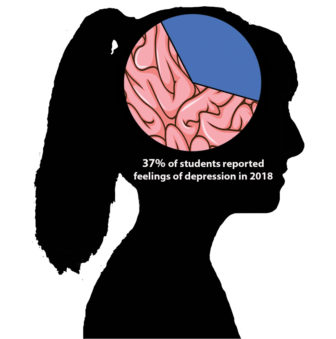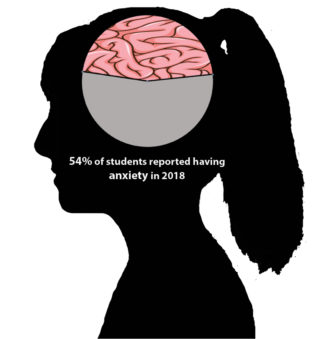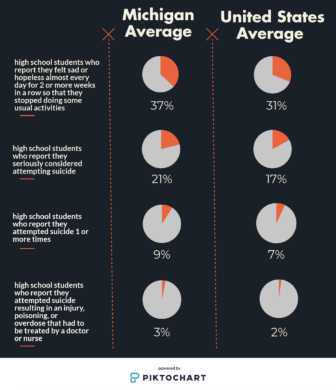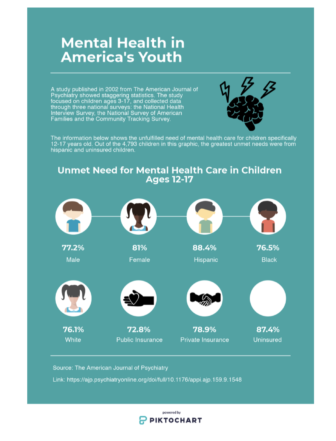Counselors, administrators and students in Okemos, Williamston and Haslett report an increase in anxiety issues among high school students across the state and are working hard to educate students about mental illness.
“We’re training to be a trainer,” said Hedlun Walton, a counselor at Okemos Public Schools for 17 years. “In the past five years, there’s been a very strong trend in mental health awareness. There are a number of reasons for that: college pressures, constant contact with the phones and social media.”
According to the National Alliance of Mental Illness website: “One in five youth live with a mental health condition, but less than half of these individuals receive needed services. Undiagnosed, untreated or inadequately treated mental health conditions can affect a student’s ability to learn, grow and develop.”

Data from the 2018 survey from the Healthy Minds Network found 37% collegiate students responded saying they had felt some form, whether it was mild or severe depression in 2018.

Data from the 2018 survey from the Healthy Minds Network found 54% collegiate students responded saying they had some form, whether it was mild or severe, of anxiety in 2018.
The Healthy Mind Network’s survey of college students show half of that population suffers from mental health issues, but student distress often crops up in high school.

Results shown above compare Michigan’s average in 2017 compared to the average of the nation, according to a 2018 Centers for Disease Control and Prevention called High School Youth Risk Behavior Surveillance System. The nationwide survey collected data from high school students from 1991-2017. The survey is ongoing.

Okemos
Among other causes such as peer-pressure, exploring sexual identity, and technology, the World Health Organization says “children and adolescents are especially vulnerable to sexual violence, which has a clear association with detrimental mental health.”
In light of the 156 sister survivors who testified their sexual assault case in January last year, Superintendent of Okemos Public Schools John Hood said he wants to make sure schools are doing their part in teaching personal safety to students.
“I want to make sure my students are empowered to be as strong as those victims were coming forward,” said Hood.
“It’s our responsibility in the public school system to keep our students safe and giving them the skills, just like a fire drill, or like alcohol and tobacco. Good touch, bad touch, personal safety lessons, how do you handle that, if it’s not handled by the adults you trust then what do you do next. Those are the things that we need to start teaching kids in the lower elementary grades because, you know, they could be vulnerable populations.”
Okemos Zen Den
The Okemos High School counseling office has a room called the Zen Den. The Zen Den is supposed to a “relaxing location for students when they need to take a break,” according to the Okemos High School counseling website.
In the room, students are only allowed to spend 10 minutes, and they are not allowed to bring their phones in there with them.
Williamston
To combat pressures that students face in high school, Lexi Michalski, a social worker at Williamston Public Schools, said there have been programs centered around mental health in Williamston, such as Be Kind and Second Step. A new one called ‘Be Nice’ has been introduced into middle schools and high school this year.
“We really like it because it gives students the language and the facts around mental health,” said Michalski. “Instead of us sitting there teaching from a textbook … it gives the kids who are involved with the Be Nice club and opportunity to come up with creative ways to share that information with their peers.
Michalski said educating students on this topic is important because there is still some misunderstanding when it comes to mental health.
“When you have the flu, you’re going to go to your doctor,” said Michalski. “If you feel like, you know, your thoughts or your actions or how you interact with people are changing, you should go investigate, get some help.”
https://soundcloud.com/user-514125172/mental-health-awareness-in-local-high-schools-can-change-school-climate-audio-story
Kailey James and Emma Kane are seniors at Williamston High School and are editors at the school’s yearbook. They both joined yearbook because it was relaxing and helped give them a break from the regular dynamics of the school day.
“Besides the ‘Be Nice’ thing, they have in the bathrooms the flyers with a bunch of numbers with suicide prevention, and if you see bullying we should report it,” said James. “We have Officer Don comes into the school and he walks around, and he helps a lot with talking to him. The same thing with the principal and vice principal, and they help get stuff situated that needs to get situated.”
Haslett High School
Haslett High School has implemented various initiatives and resources in the school. The program ‘Be Nice’ is a district-wide initiative. The program urges the administration to reach out to students dealing with mental health conditions, bullying, trauma, etc. to post information around the school for students who may need the resources.
Graham Diedrich, a senior at Haslett High School, has dealt with anxiety, depression and an eating disorder. Although his journey has not been easy, he describes his experience at Haslett as being “an overall positive experience in learning new things and hanging out with friends.” With this, Graham knows more could be done to change the stigma of mental health with Haslett.
“[They] seem like they really want to help students,” said Graham. “Some of the methods the school presents need change (like Be Nice). Also, maybe more education on the topic, especially of more niche mental health issues. I think improvement could be made because a lot of students just view the programs as ineffective.”
Along with Graham recognizing that programs need improvement, the school administration has still been helpful where they can. Graham said he feels as though everyone knows about mental health, but very few people talk about it or get help from the school, deciding to talk to friends and family instead.
“The most difficult part of it all is stress,” said Graham. “I feel compelled to workout every day, which is hard in high school when you want to have a social life and do well in school … the school hasn’t really done anything at an administrative level since I’m not sure they are aware of anything. But personally, my relationships with teachers and talking to different staff makes my days brighter.”
While resources are available at some public high schools in programs like Michigan Model for Health, United in Social Progress and Mental Health Awareness weeks, some students and parents still face hardships when it comes to destigmatizing mental health within public schools.
Results shown above compare Michigan’s average in 2017 compared to the average of the nation, according to a 2018 Centers for Disease Control and Prevention called High School Youth Risk Behavior Surveillance System. The nationwide survey collected data from high school students from 1991-2017. The survey is ongoing.
The Parent Perspective
As sensitive as the topic of mental health can be, the unresponsiveness of school administrators in answering questions around mental health awareness reflects difficulties in accessing information. Catherine Ruster, a parent at Okemos High School, feels support and resources for students with mental health conditions are available if requested.
“I haven’t had to use any, but there is significant communication about this so I believe support and resources are available,” Ruster wrote in an email.
When asking Ruster about the crisis and emotional support that Okemos has to offer, Ruster said if her family were to need the support it would be there academically. While she does not expect them to offer comprehensive, psychological assistance, she knows they would be able to assist with referrals for appropriate care and school needs.
Andy C, a parent at Okemos (who chooses not to disclose her full last name due to the sensitive subject matter), has two children who attend Okemos High School. One of her children has dealt with mental health conditions since middle school.
Doctors diagnosed Andy’s child with severe depression, Post-Traumatic Stress Disorder and an anxiety disorder, following several suicide attempts while in middle school. Andy believes Okemos is very supportive but could implement more programs within the classrooms that focus on educating other students on how to support their peers.
“It wasn’t until my daughter’s diagnosis, treatment, therapy and everything that we are going through, that I realized I wasn’t necessarily misinformed but how uninformed I was,” said Andy.
He said he would support the inclusion of mental health in the curriculum because knowledge is power, dispelling the negative stigma surrounding mental health conditions in society.
Students Stand Strong

Okemos High School has 1295 students, according to Niche.com. It’s located at 2800 Jolly Rd, Okemos, MI 48864. Credit: Karrun Farmaha)
Erin Ruster, a freshman at Okemos High School, is a part of the United in Social Progress, which is an organization where participants are nominated by teachers to serve.
These students identify key issues faced by students at Okemos and work to address them with teacher supervision. Erin Ruster was able to select mental health awareness as her concentration in the program. While being a listening ear for some of her peers and close friends who have conditions like anxiety, depression etc., she realizes how important these resources are and how they can be improved.
“They [Okemos High School] have posters around for places you can call and hotlines,” said Erin. “And they always say you can go to a counselor, but nothing super progressive.”
The Professional’s Insight
Rachel Menger, an Okemos licensed professional counselor, works with many students who attend school in Okemos, East Lansing, Dewitt, and other surrounding areas.
Her main goal is to assure that students are able to develop healthier coping skills with mental health conditions before leaving high school so they can apply them to college and/or a career.
“I believe in order for students to have the best possibility of success in school would be for teachers and other staff to receive more training in recognizing symptoms in their students who may be struggling with a mental health condition,” said Menger. “It is also imperative that the school work with the student’s mental health professionals to ensure they are given the proper resources in class to succeed.”
With this, Menger said one of the best ways parents and administration can better support these students is to become educated in mental health conditions in students, as well as learning to recognize symptoms sooner.



